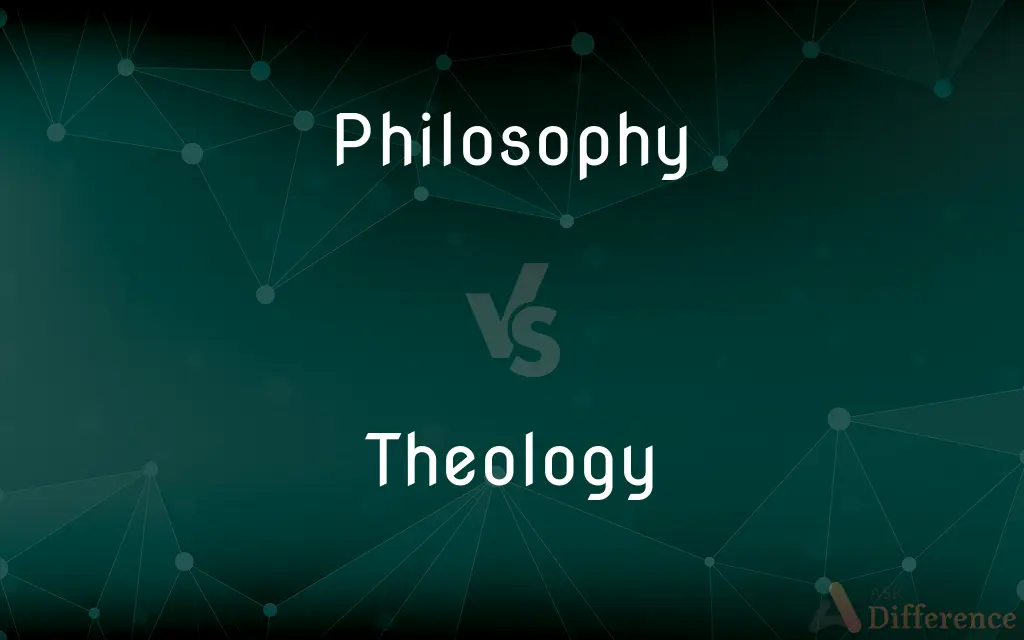Philosophy vs. Theology — What's the Difference?

Difference Between Philosophy and Theology
ADVERTISEMENT
Compare with Definitions
Philosophy
Philosophy (from Greek: φιλοσοφία, philosophia, 'love of wisdom') is the study of general and fundamental questions, such as those about existence, reason, knowledge, values, mind, and language. Such questions are often posed as problems to be studied or resolved.
Theology
Theology is the systematic study of the nature of the divine and, more broadly, of religious belief. It is taught as an academic discipline, typically in universities and seminaries.
Philosophy
The study of the fundamental nature of knowledge, reality, and existence, especially when considered as an academic discipline.
Theology
The study of the nature of God and religious truth; rational inquiry into religious questions.
Philosophy
A theory or attitude that acts as a guiding principle for behaviour
Don't expect anything and you won't be disappointed, that's my philosophy
ADVERTISEMENT
Theology
A system or school of opinions concerning God and religious questions
Protestant theology.
Jewish theology.
Philosophy
The study of the nature, causes, or principles of reality, knowledge, or values, based on logical reasoning.
Theology
A course of specialized religious study usually at a college or seminary.
Philosophy
A system of thought based on or involving such study
The philosophy of Hume.
Theology
(uncountable) The study of God, a god, or gods; and of the truthfulness of religion in general.
Philosophy
The study of the theoretical underpinnings of a particular field or discipline
The philosophy of history.
Theology
(uncountable) religious studies
Philosophy
An underlying theory or set of ideas relating to a particular field of activity or to life as a whole
An original philosophy of advertising.
An unusual philosophy of life.
Theology
(countable) An organized method of interpreting spiritual works and beliefs into practical form.
Philosophy
The love of wisdom.
Theology
(countable) A particular belief within a religion.
Philosophy
(uncountable) An academic discipline that seeks truth through reasoning rather than empiricism.
Philosophy is often divided into five major branches: logic, metaphysics, epistemology, ethics and aesthetics.
Theology
Subjective marginal details.
Philosophy
(countable) A comprehensive system of belief.
Theology
The science of God or of religion; the science which treats of the existence, character, and attributes of God, his laws and government, the doctrines we are to believe, and the duties we are to practice; divinity; (as more commonly understood) "the knowledge derivable from the Scriptures, the systematic exhibition of revealed truth, the science of Christian faith and life."
Many speak of theology as a science of religion [instead of "science of God"] because they disbelieve that there is any knowledge of God to be attained.
Theology is ordered knowledge; representing in the region of the intellect what religion represents in the heart and life of man.
Philosophy
(countable) A view or outlook regarding fundamental principles underlying some domain.
A philosophy of government;
A philosophy of education
Theology
The rational and systematic study of religion and its influences and of the nature of religious truth
Philosophy
(countable) A general principle (usually moral).
Theology
A particular system or school of religious beliefs and teachings;
Jewish theology
Roman Catholic theology
Philosophy
(archaic) A broader branch of (non-applied) science.
Theology
The learned profession acquired by specialized courses in religion (usually taught at a college or seminary);
He studied theology at Oxford
Philosophy
A calm and thoughtful demeanor; calmness of temper.
Philosophy
Synonym of small pica.
Philosophy
To philosophize.
Philosophy
Literally, the love of, inducing the search after, wisdom; in actual usage, the knowledge of phenomena as explained by, and resolved into, causes and reasons, powers and laws.
Philosophy
A particular philosophical system or theory; the hypothesis by which particular phenomena are explained.
[Books] of Aristotle and his philosophie.
We shall in vain interpret their words by the notions of our philosophy and the doctrines in our school.
Philosophy
Practical wisdom; calmness of temper and judgment; equanimity; fortitude; stoicism; as, to meet misfortune with philosophy.
Then had he spent all his philosophy.
Philosophy
Reasoning; argumentation.
Of good and evil much they argued then, . . . Vain wisdom all, and false philosophy.
Philosophy
The course of sciences read in the schools.
Philosophy
A treatise on philosophy.
Philosophy
A belief (or system of beliefs) accepted as authoritative by some group or school
Philosophy
The rational investigation of questions about existence and knowledge and ethics
Philosophy
Any personal belief about how to live or how to deal with a situation;
Self-indulgence was his only philosophy
My father's philosophy of child-rearing was to let mother do it
Share Your Discovery

Previous Comparison
Matric vs. Matrix
Next Comparison
Loyal vs. Reliable














































